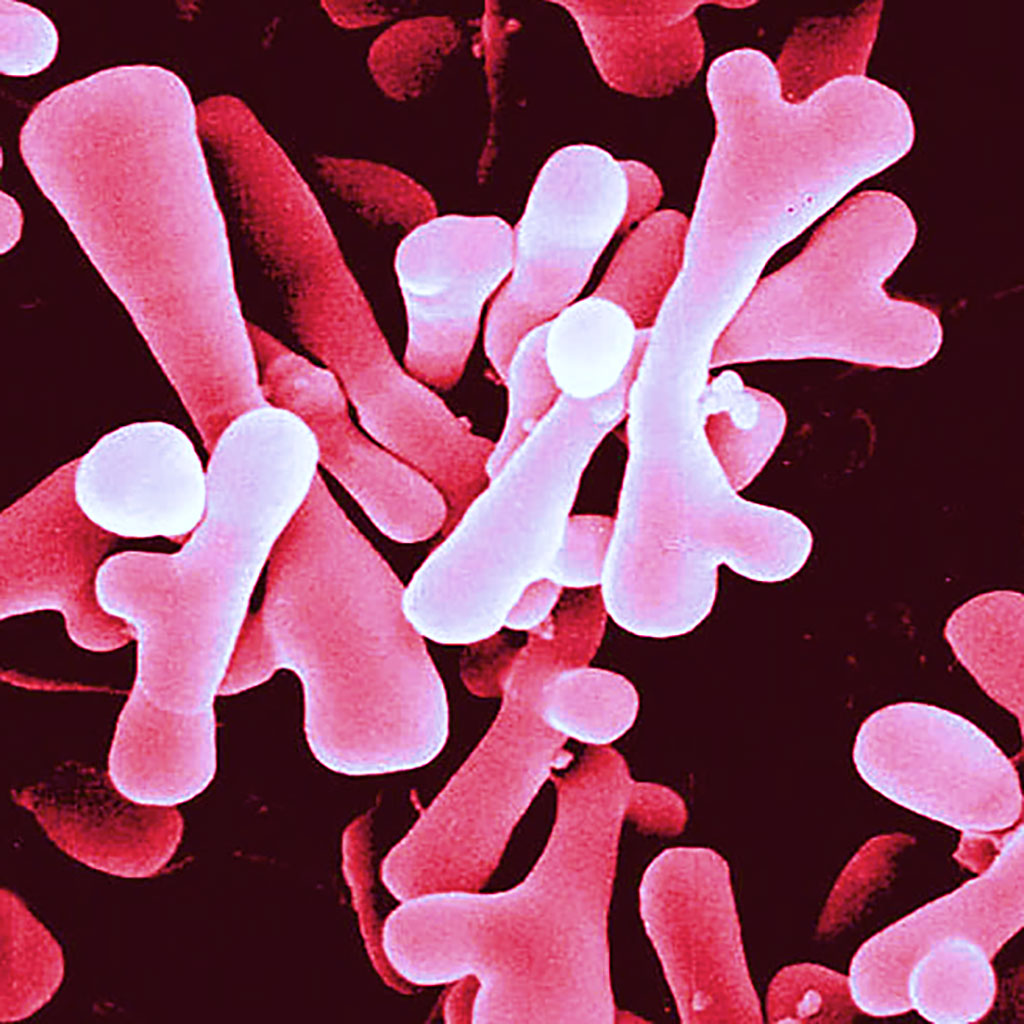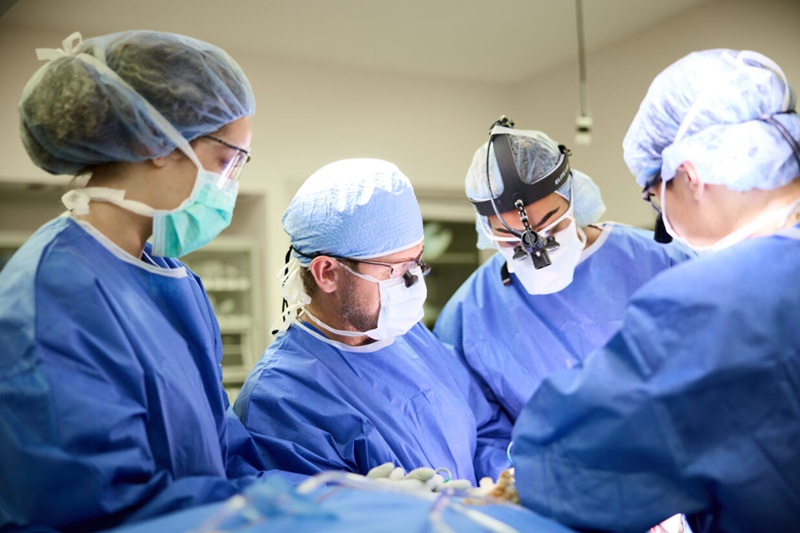ABO Histo-Blood Groups Influence Makeup of Gut Microbiome
|
By LabMedica International staff writers Posted on 01 Feb 2021 |

Image: False-colored electron microscopic image of Bifidobacterium that are one of the major genera of bacteria that make up the gastrointestinal tract and are associated with variants in the lactase gene locus (Photo courtesy of The Keck Science Department of the Claremont Colleges)
Recent genome-wide association studies yielded inconsistent, underpowered and rarely replicated results such that the role of human host genetics as a contributing factor to microbiome assembly and structure remains uncertain.
The intestinal microbiome is implicated as an important modulating factor in multiple inflammatory, neurologic and neoplastic disease. Host genetics, including genes affecting ABO histo-blood groups, may influence the composition of the human gut microbiome.
A large team of scientists at Kiel University (Kiel, Germany) and their colleagues conducted a large genome-wide association study of microbial traits that drew on five cohorts from different regions of Germany that encompassed a total of 8,965 individuals. Following a series of multivariate, univariate abundance, and presence-absence pattern analyses, they uncovered 38 genetic loci associated with the presence of particular bacteria and broad gut microbial community composition.
The team noted an association between variants in the lactase gene locus (LCT) and the genus Bifidobacterium. This association was nominal in four of the five cohorts and stronger in the fifth. They also found an association between a Barnesiella bacterial species and variants in the biliverdin reductase A (BLVRA) gene, which encodes a protein that inhibits toll-like receptor 4 (TLR4) gene expression. The TLR-4 protein is a pattern recognition receptor of the ABO allele.
The scientists investigated ABO histo-blood group associations, including FUT2 secretor status, with microbial features. They found a correlation between non-O blood group and positive secretor status and certain Bacteroides species in four of the five cohorts. Another Bacteroides species, they noted, was also associated with ABO blood status, bolstering the idea that there are histo-blood group-dependent effects on Bacteroides. They further uncovered associations between Faecalibacterium and ABO and between Holdemanella and ABO, as well as an association between FUT2 secretor status and the abundance of Roseburia, independent of ABO type.
Through a Mendelian randomization analysis, the scientists found 19 suggestive microbial effects on host traits, nine of which were tied to Inflammatory Bowel Disease (IBD) or Crohn's disease. One, for instance, suggests that a group of Bacteroides is associated with ABO histo-blood group status and a group of Prevotella appears to protect against Crohn's disease.
Malte Christoph Rühlemann, PhD, the first author of the study, said, “Ultimately, the aim is to identify candidate genes that are investigated in functional studies and that can at one time point be used in a framework of personalized treatment which considers multiple layers of host factors: life history, genetics, the microbiome, and the interaction of them all as target and modulator of treatment success.”
The authors concluded that their findings support the notion that ABO histo-blood group and sector status influences the makeup of the gut microbiome and that they could potentially represent targets for modulating human health and disease. The study was published on January 18, 2021 in the journal Nature Genetics.
Related Links:
Kiel University
The intestinal microbiome is implicated as an important modulating factor in multiple inflammatory, neurologic and neoplastic disease. Host genetics, including genes affecting ABO histo-blood groups, may influence the composition of the human gut microbiome.
A large team of scientists at Kiel University (Kiel, Germany) and their colleagues conducted a large genome-wide association study of microbial traits that drew on five cohorts from different regions of Germany that encompassed a total of 8,965 individuals. Following a series of multivariate, univariate abundance, and presence-absence pattern analyses, they uncovered 38 genetic loci associated with the presence of particular bacteria and broad gut microbial community composition.
The team noted an association between variants in the lactase gene locus (LCT) and the genus Bifidobacterium. This association was nominal in four of the five cohorts and stronger in the fifth. They also found an association between a Barnesiella bacterial species and variants in the biliverdin reductase A (BLVRA) gene, which encodes a protein that inhibits toll-like receptor 4 (TLR4) gene expression. The TLR-4 protein is a pattern recognition receptor of the ABO allele.
The scientists investigated ABO histo-blood group associations, including FUT2 secretor status, with microbial features. They found a correlation between non-O blood group and positive secretor status and certain Bacteroides species in four of the five cohorts. Another Bacteroides species, they noted, was also associated with ABO blood status, bolstering the idea that there are histo-blood group-dependent effects on Bacteroides. They further uncovered associations between Faecalibacterium and ABO and between Holdemanella and ABO, as well as an association between FUT2 secretor status and the abundance of Roseburia, independent of ABO type.
Through a Mendelian randomization analysis, the scientists found 19 suggestive microbial effects on host traits, nine of which were tied to Inflammatory Bowel Disease (IBD) or Crohn's disease. One, for instance, suggests that a group of Bacteroides is associated with ABO histo-blood group status and a group of Prevotella appears to protect against Crohn's disease.
Malte Christoph Rühlemann, PhD, the first author of the study, said, “Ultimately, the aim is to identify candidate genes that are investigated in functional studies and that can at one time point be used in a framework of personalized treatment which considers multiple layers of host factors: life history, genetics, the microbiome, and the interaction of them all as target and modulator of treatment success.”
The authors concluded that their findings support the notion that ABO histo-blood group and sector status influences the makeup of the gut microbiome and that they could potentially represent targets for modulating human health and disease. The study was published on January 18, 2021 in the journal Nature Genetics.
Related Links:
Kiel University
Latest Molecular Diagnostics News
- POC Test Uses Fingerstick Blood, Serum, Or Plasma Sample to Detect Typhoid Fever
- Rapid Testing Panel Simultaneously Detects 15 Drugs of Abuse in Urine Within 21 Minutes
- New Test Detects Breast Reconstruction-Related Infections Before Symptoms Appear
- Period Blood Test for HPV Could Replace Cervical Screening
- New Genetic Tools Improve Breast Cancer Risk Prediction for African American Women
- Single-Use Test Strip to Revolutionize Disease Diagnosis
- Diagnostic Device Predicts Treatment Response for Brain Tumors Via Blood Test
- Blood Test Detects Early-Stage Cancers by Measuring Epigenetic Instability
- Two-in-One DNA Analysis Improves Diagnostic Accuracy While Saving Time and Costs
- “Lab-On-A-Disc” Device Paves Way for More Automated Liquid Biopsies
- New Tool Maps Chromosome Shifts in Cancer Cells to Predict Tumor Evolution
- Blood Test Identifies Inflammatory Breast Cancer Patients at Increased Risk of Brain Metastasis
- Newly-Identified Parkinson’s Biomarkers to Enable Early Diagnosis Via Blood Tests
- New Blood Test Could Detect Pancreatic Cancer at More Treatable Stage
- Liquid Biopsy Could Replace Surgical Biopsy for Diagnosing Primary Central Nervous Lymphoma
- New Tool Reveals Hidden Metabolic Weakness in Blood Cancers
Channels
Clinical Chemistry
view channel
New PSA-Based Prognostic Model Improves Prostate Cancer Risk Assessment
Prostate cancer is the second-leading cause of cancer death among American men, and about one in eight will be diagnosed in their lifetime. Screening relies on blood levels of prostate-specific antigen... Read more
Extracellular Vesicles Linked to Heart Failure Risk in CKD Patients
Chronic kidney disease (CKD) affects more than 1 in 7 Americans and is strongly associated with cardiovascular complications, which account for more than half of deaths among people with CKD.... Read moreMolecular Diagnostics
view channel
POC Test Uses Fingerstick Blood, Serum, Or Plasma Sample to Detect Typhoid Fever
Typhoid fever is an acute febrile illness caused by Salmonella enterica serovar Typhi (S. Typhi) and affects an estimated 11–21 million people globally each year, resulting in approximately 128,000–161,000... Read more
Rapid Testing Panel Simultaneously Detects 15 Drugs of Abuse in Urine Within 21 Minutes
Illicit drug use and excessive use of prescription medicine is growing across the US amid a severe opioid crisis. Although overdose fatalities were reported to have declined by nearly 27% in 2024, many... Read moreHematology
view channel
New Guidelines Aim to Improve AL Amyloidosis Diagnosis
Light chain (AL) amyloidosis is a rare, life-threatening bone marrow disorder in which abnormal amyloid proteins accumulate in organs. Approximately 3,260 people in the United States are diagnosed... Read more
Fast and Easy Test Could Revolutionize Blood Transfusions
Blood transfusions are a cornerstone of modern medicine, yet red blood cells can deteriorate quietly while sitting in cold storage for weeks. Although blood units have a fixed expiration date, cells from... Read more
Automated Hemostasis System Helps Labs of All Sizes Optimize Workflow
High-volume hemostasis sections must sustain rapid turnaround while managing reruns and reflex testing. Manual tube handling and preanalytical checks can strain staff time and increase opportunities for error.... Read more
High-Sensitivity Blood Test Improves Assessment of Clotting Risk in Heart Disease Patients
Blood clotting is essential for preventing bleeding, but even small imbalances can lead to serious conditions such as thrombosis or dangerous hemorrhage. In cardiovascular disease, clinicians often struggle... Read moreImmunology
view channelBlood Test Identifies Lung Cancer Patients Who Can Benefit from Immunotherapy Drug
Small cell lung cancer (SCLC) is an aggressive disease with limited treatment options, and even newly approved immunotherapies do not benefit all patients. While immunotherapy can extend survival for some,... Read more
Whole-Genome Sequencing Approach Identifies Cancer Patients Benefitting From PARP-Inhibitor Treatment
Targeted cancer therapies such as PARP inhibitors can be highly effective, but only for patients whose tumors carry specific DNA repair defects. Identifying these patients accurately remains challenging,... Read more
Ultrasensitive Liquid Biopsy Demonstrates Efficacy in Predicting Immunotherapy Response
Immunotherapy has transformed cancer treatment, but only a small proportion of patients experience lasting benefit, with response rates often remaining between 10% and 20%. Clinicians currently lack reliable... Read morePathology
view channel
Engineered Yeast Cells Enable Rapid Testing of Cancer Immunotherapy
Developing new cancer immunotherapies is a slow, costly, and high-risk process, particularly for CAR T cell treatments that must precisely recognize cancer-specific antigens. Small differences in tumor... Read more
First-Of-Its-Kind Test Identifies Autism Risk at Birth
Autism spectrum disorder is treatable, and extensive research shows that early intervention can significantly improve cognitive, social, and behavioral outcomes. Yet in the United States, the average age... Read moreTechnology
view channel
Robotic Technology Unveiled for Automated Diagnostic Blood Draws
Routine diagnostic blood collection is a high‑volume task that can strain staffing and introduce human‑dependent variability, with downstream implications for sample quality and patient experience.... Read more
ADLM Launches First-of-Its-Kind Data Science Program for Laboratory Medicine Professionals
Clinical laboratories generate billions of test results each year, creating a treasure trove of data with the potential to support more personalized testing, improve operational efficiency, and enhance patient care.... Read moreAptamer Biosensor Technology to Transform Virus Detection
Rapid and reliable virus detection is essential for controlling outbreaks, from seasonal influenza to global pandemics such as COVID-19. Conventional diagnostic methods, including cell culture, antigen... Read more
AI Models Could Predict Pre-Eclampsia and Anemia Earlier Using Routine Blood Tests
Pre-eclampsia and anemia are major contributors to maternal and child mortality worldwide, together accounting for more than half a million deaths each year and leaving millions with long-term health complications.... Read moreIndustry
view channel
WHX Labs in Dubai spotlights leadership skills shaping next-generation laboratories
WHX Labs in Dubai (formerly Medlab Middle East), held at Dubai World Trade Centre (DWTC) from 10–13 February, brings together international experts to discuss the factors redefining laboratory leadership,... Read moreNew Collaboration Brings Automated Mass Spectrometry to Routine Laboratory Testing
Mass spectrometry is a powerful analytical technique that identifies and quantifies molecules based on their mass and electrical charge. Its high selectivity, sensitivity, and accuracy make it indispensable... Read more
AI-Powered Cervical Cancer Test Set for Major Rollout in Latin America
Noul Co., a Korean company specializing in AI-based blood and cancer diagnostics, announced it will supply its intelligence (AI)-based miLab CER cervical cancer diagnostic solution to Mexico under a multi‑year... Read more

















